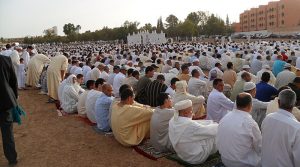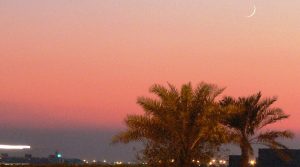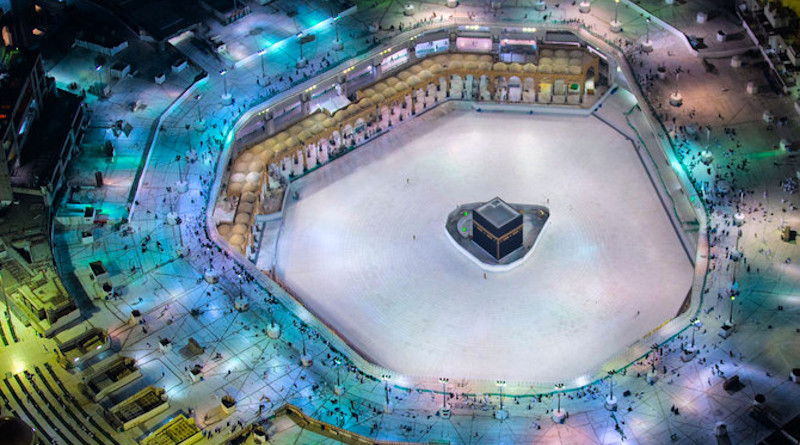Muslim World Celebrations In The Uncertain Times Of COVID-19 – Analysis
One of the pillars of Islam, the month of fasting sawm/siyam, during which believers must, among other things, abstain from eating and drinking from sunrise to sunset, is traditionally a time of sharing, gathering and conviviality. It is also a month of prayer and religious piety during which Muslims converge in large numbers in mosques, especially at night. This year, it comes amid the coronavirus pandemic forcing people to maintain lockdown restrictions and social distance in public places to check the propagation of the deadly virus by reducing the contamination from person to person.
The International Union of Muslim Scholars (IUMS) announced that the coronavirus epidemic does not prevent fasting, except for those infected. In a statement, the IUMS said that during the month of Ramadan, the situation in the Muslim world and the world at large regarding COVID-19 was being closely monitored. The Union pointed out that there are several debates about whether or not fasting should be done in times of epidemic.
“Fasting during the month of Ramadan is one of the main rules of Islam. Fasting is a divine obligation for all Muslims except for those who are sick, traveling and are exempt from it for various reasons such as old age or pregnancy. Except for those infected with the virus, COVID-19 does not prevent fasting. Scientific studies show that fasting does not weaken the immune system, on the contrary, it strengthens cell renewal and has many benefits for the body,” the release of the IUMS stated.
Ramadan In Time Of The Pandemic
Saudi Arabia, which is home to Islam’s first two holy places, as well as most Arab countries – including Syria, Egypt, Tunisia, Jordan and Bahrain – announced the beginning of Ramadan on Friday April 24, 2020.
One of the pillars of Islam, the month of fasting, during which believers must abstain from eating and drinking from sunrise to sunset, is traditionally a time of gathering. It is also a month of prayer during which Muslims converge in large numbers in mosques, especially at night.
But as a result of COVID-19, almost all Muslim countries have closed mosques and asked people to pray in their homes, sometimes imposing stay-at-home restrictions and curfews to prevent the spread of the virus. Restrictions supported, in most cases, by religious authorities through religious edicts, fatwas.
King Salman of Arabia said he was “saddened that the holy month comes in circumstances that prevent us from praying such as tarawih (night prayers) in mosques, because of the preventive measures to protect the life and health of people in the fight against the new coronavirus pandemic“.
One of the pillars of Islam, the month of fasting, is traditionally a time of gathering. It is also a month of prayer during which Muslims converge in large numbers in mosques, especially at night.
Coronavirus obliges, the meal of breaking the fast (iftar) will thus be taken alone at home, whereas it is normally the occasion to gather around large tables within the extended family, between friends or at prayer sites. The evening prayer, which is customary at the mosque after the meal, will also be held at home.

With the widespread containment in Middle Eastern and North African countries and the Muslim world, at large, due to the COVID-19 pandemic the month of the Ramadan fast appears bleak. The fasting month is usually a time of high household consumption in the Arab-Muslim world, but this year traders are likely to be hit hard by the fears of shoppers, who want above all to buy masks, gloves or disinfectant.
While the lockdown prevents the festivities, it does not exempt “healthy” Muslims from fasting “as in previous years,” the WHO says. Patients with COVID-19, on the other hand, are urged to consult their doctors about fasting “as they would for any other illness,” the organization adds.
Religious leaders continue their traditional calls for charity zakat/sadaqa, one of the five pillars of Islam. Although channeled to countries at war, such as Libya, Syria and Yemen, some of the faithful are determined not to forget the poor this year of pandemic.
Ramadan And Lockdown
No gatherings for large evening meals (iftar), no night prayer at the mosque (tarawih), no meeting with friends until late at night, no travel to the holy cities of Islam. In many countries, it will therefore be “Ramadan in private, far from each other and far from the mosques“, as Taulant Bica, one of the leaders of the Albanian Muslim community, sums up.
“Our hearts weep,” mourns the muezzin of the deserted Great Mosque of Mecca. For this exceptional year, the World Health Organization (WHO) had also clearly advocated “the cancellation of social and religious gatherings“, including “in places associated with the activities of Ramadan, such as places of entertainment, markets and shops“. However, it said that confinement does not exempt “healthy” Muslims from fasting, “as in previous years“.
In Iran, the Middle East country most affected by the pandemic, the Iranian supreme leader, Ayatollah Ali Khamenei, has called on his fellow citizens to avoid all gatherings, without “neglecting prayer“. Fasting and praying at home, is also recommended by the religious affairs directorate, Diyanet, in Turkey. In Russia, too, the faithful are encouraged to pray at home.
In Kosovo and Albania, two countries with a strong Muslim majority, the faithful are asked to observe religious rites at home, as in France, Austria and Germany. No collective prayers are permitted in Bulgaria and Bosnia either.
In Germany, where mosques remain closed despite the gradual lifting of restrictions over the next few weeks, places of worship in Berlin have prepared “Koran recitations”, “prayers” and “online speeches”. Similarly in the Netherlands, a country not totally in lockdown, Ramadan prayer services will be streamed to worshippers.
In sub-Saharan Africa, the Senegalese, more than 90 per cent Muslim, are preparing for an unusual Ramadan, with a ban on collective prayers and the closure of mosques. The Senegalese will therefore be deprived of nafilas (prayers after the breaking of the fast). Religious conferences, a key activity during this month, have been cancelled. In addition, while Ramadan is traditionally a period of meetings and travel between the interior of the country and Dakar, on the Atlantic coast, population movements between cities have been banned by the authorities.
In order to ensure that aid to the most deprived is not too much affected by the lockdown measures, associations and authorities are organizing themselves differently. In Turkey, for example, external public iftars organized in favour of the most needy will not be able to take place, but the municipalities of Istanbul and Ankara are planning to distribute dishes or send food parcels to them. In Senegal, Alassane Ndour, a former Senegalese football international, and his association will not offer meals, but will distribute “food, rice, sugar and millet,” he says.
On a Ramadan evening in Cairo, Casablanca or Baghdad, there are crowded mosques to celebrate both Allah and the unity of the Ummah, the community of believers. In Egypt, the most religious people live even the last ten days of the holy month inside the mosques to study and pray. There are also, traditionally, in the middle of the street, huge tables, sometimes of several hundred people, who break the fast together. For the poorest, to whom the meal is offered, it is the only occasion of the year to eat meat, but not this year because of the danger of the propagation of the deadly virus.
The COVID-19 pandemic is forcing governments, religious authorities and people in the Middle East and the Muslim world to imagine a totally new Ramadan. On Thursday April 23, 2020, Ayatollah Khamenei himself, the Supreme Leader of the Islamic Republic of Iran, appeared on national television to prepare minds for a very likely ban on gatherings.

Saudi Arabia, the guardian of the holy city of Mecca, suspended little pilgrimage : Umra on 27 February 27, 2020. The cancellation of the 2.5 million visas for the Hajj, the great pilgrimage at the end of July, one of the five pillars of Islam, has already been mentioned. Never seen since 1798 and Napoleon Bonaparte’s expedition to Egypt such a thing has happened.
The religious authorities have already adapted the call to prayer to the small and wealthy Kuwait, which resounds five times a day, enjoining the faithful to prostrate themselves… at home.
But what will it be like in the popular districts of Cairo, Baghdad or Tehran? The lockdown there is largely braved by inhabitants forced to support their families.
Some Are Resisting
In Asia, a continent where more than a billion Muslims reside, health security measures are more difficult to put in place, as faith sometimes takes precedence over all other considerations. In Pakistan, imams have convinced the authorities not to close places of worship. Night after night, friends and family will celebrate iftar together.
In Bangladesh, religious dignitaries have swept aside the authorities’ health recommendations. In that country, the government has called for a reduction in attendance at mosques. “Islam does not support the imposition of any kind of attendance quota,” thundered an imam belonging to one of the country’s major imam groups.
In Indonesia, where millions of people go to their hometowns and villages after Ramadan, the government has finally banned such population movements for fear of an explosion of COVID-19 cases.
After Ramandan Comes Eid Al-Fitr
The Muslim calendar has two major holidays: Eid al-Fitr, “the Feast of the Breaking of the Fasting”, also called Eid as-Seghir, “the Small Feast” which marks the end of the month of Ramadan, and Eid al-Adha, “the Feast of Sacrifice”, also called Eid al-Kabir, “the Great Feast”, which marks the end of the period of pilgrimage to Mecca, one of the five pillars of Islam.

Eid al-Fitr, one of the biggest festivals of Muslims is just around the corner and people across the world are gearing up to celebrate the auspicious day with joy and reverence and also a lot of apprehension and fear during these tmes of pandemic and uncertainty.
However, just like Ramdan, the date of Eid is traditionally dependent on the sighting of the moon, and Muslims around the world are keen to know the date. Based on the lunar calendar, Eid al-Fitr commences with the sighting of the new crescent moon which brings the end of Ramadan and the onset of the month of Shawwal.
The date of Eid al-Fitr falls the day after the holy month of Ramadan, that is to say after 29 or 30 days. The date of Eid el-Fitr will be specified during the night of doubt (night observation of the sky to determine the end of a lunar month. The appearance of the thin crescent moon following the new moon is an indicator of this).
Eid al-Fitr, is the first day of the Islamic month of Shawwal. It marks the end of Ramadan, which is a month of fasting, prayer and alms-giving to the needy. Many Muslims attend communal prayers, listen to a khutba (sermon) and give zakat al-fitr (charity in the form of food or alternatively money) during this religious celebration of communion, togetherness, solidarity and compassion but this is impossible for this year since most Muslim countries are either still in lockdown or have banned praying in mosques to check the progress of the coronavirus.
However, the Muslims of Canada will be able to do the Eid in mosques. This country, like the rest of the world, has barricaded itself in the face of the deadly virus that was knocking at its doors, worshippers in the provinces of Alberta and British Columbia watched with emotion as the doors of the mosques opened again before them. They are opening timidly and partially, with the consent of the Muslim Association of Canada (MAC). After weeks of being forced to gather at home, the Muslim community wants to believe that this limited, cautious, almost shivering reopening of the Muslim holy grounds is a good omen in these last bright nights of Ramadan. “In accordance with provincial and health guidelines, the Muslim Association of Canada (MAC) has decided, after careful consideration, to reopen the places of worship for 50 or fewer people,” the official press release said.
Eid al-Fitr marks the end of Ramadan and is a three-day celebration which is marked by public holidays in the Arab world. Employees across private and public sectors are set to get three days off to mark the celebration in some countries like Saudi Arabia it is a week long holiday. In 2020, Ramadan started on April 24, Friday, in most counties, Eid al-Fitr will most likely start on Sunday May 24.
People traditionally travel to visit their families or go to touristic areas for a change in Middle Eastern countries like Iran. Iranian health official called on citizens on Thursday to avoid travelling during the Eid al-Fitr holiday later this month to avoid the risk of a new surge of the novel coronavirus infection.
“I am urging you not to travel during the Eid. Definitely, such trips mean new cases of infection…People should not travel to and from those high-risk red areas,” Health Minister Saeed Namaki was quoted by state television as saying.
“Some 90% of the population in many areas has not yet contracted the disease. In the case of a new outbreak, it will be very difficult for me and my colleagues to control it,” he added.
On Thursday, Iran’s deputy health minister also revealed that some 10,000 Iranian health workers have been infected with COVID-19. Confirmed cases in Iran rose by 2,346 to 126,949 on Wednesday, the health ministry said, noting that deaths reached 7,183, according to Reuters.
Sighting The Moon
Unlike the Gregorian calendar followed by the West, the Islamic calendar is lunar that is to say, based on the moon. Since lunar months are shorter than solar months, Muslim’s holy month of Ramadan, which takes place in the ninth month of the Islamic year, occurs approximately 11 days earlier every year depending on when the moon is sighted and hence, varying from country to country by about a day.

The Sirius Association of Astronomy based in Constantine, Algeria, has communicated the astronomical data relating to the New Moon of the month of Ramadhan 1441 which determines the end of the month of fasting. On Friday, May 22, which is the night of doubt, the lunar crescent will be totally invisible to the naked eye as well as with a telescope throughout the Muslim world. Logically, the month of Ramadan should have 30 days and therefore Eid should be celebrated on Sunday, May 24, 2020.
The Sirius Association of Astronomy says that “only a wrong observation could lead to the celebration of Eid El Fitr on Saturday 23rd May, a situation that has unfortunately happened too often in the past“. However, the Sirius Association rejects this hypothesis for this year, since it will be impossible to see the lunar crescent on Friday 22 May, the night of doubt.
For countries such as Morocco, Iran, Sudan, Oman, Pakistan, Bangladesh, which began the month of fasting on Saturday, April 25, 2020 and for which the 29th of Ramadhan will be Saturday, May 23, the Sirius Association of Astronomy specifies that the observation of the lunar crescent will be difficult to the naked eye but not impossible. There is therefore a serious possibility of seeing these countries complete the month of Ramadan at 30 days. This will make them celebrate Eid on Monday May 25, 2020 instead of Sunday May 24.
However, it must be pointed out that for this year, for Muslims around the globe, while the joyful victory of completing a month-long daytime fasting remains, COVID-19 will take the shine off this year’s Eid al-Fitr mainly because families will not be able to meet to share a meal, people will not be able to go to cafés to meet friends over a cup of tea or coffee and children will not be able to show their new clothes to other children and rejoice in the streeets. Eid will be a sad occasion celebrated like Ramadan intra muros.
This 1441 Eid season will not be celebrated in family as it is the custom all over the Muslim world whereby people travel extensively to spend the holiday with parents and extended family as in the case of Morocco where people living in big cities, for work reasons, will travel to their native small cities to be with their parents and the big family, and this celebration like the Feast of Sacrifice Eid al-Adha are very important family get together occasions.
Similar tradition takes place in Indonesia, which has the world’s largest Muslim population. It has, this year enacted a strict and painful ban on “mudik,” the homecoming of vast numbers of migrant for Eid al-Fitr, and a stoppage of domestic and international air and sea travel. This ruins hoteliers’ hopes of high occupancies during this religious season.
Muslims refer to a lunar calendar, which is about 11 days shorter than the solar calendar used in Western civilizations. The term “Ramadan”, usually used to refer to the fasting practiced by Muslims, is primarily the name of the ninth month of the Islamic calendar. The next month, the tenth, is called Shawwal.
Eid al-Fitr is therefore the first day of the month of Shawwal, and is translated as the festival of breaking (fasting). Although its name differs from country to country, this feast symbolises the triumph achieved during the privations of Ramadan.
The Prophet Muhammad established two festivals of Eid, modelled on the ancestral festivals of the city of Medina. Eid al-Fitr is the first, it is also known as Eid as-Seghir (small feast) as opposed to Eid al-Kebir (big feast) which celebrates, two months later, the sacrifice.
Traditions During Eid El-Fitr
An intense moment of celebration for the Muslim community, Eid el-Fitr begins early in the morning in the mosques with the Eid prayer. It is customary to have eaten dates for breakfast and to give alms. Joy and liberation then punctuate these three days of celebration.
If Eid al-Fitr is to be celebrated in abundance, some of the most pious Muslims may choose to continue fasting for another six days. The meaning of this additional practice is not obligatory and allows one to purify oneself for the rest of the year.
The very festive and warm event of Eid al-Fitr is an opportunity for the Muslim community to exchange vows, offer gifts, especially to children, and visit friends and family, thus rekindling social ties. A large traditional cleaning is carried out in the houses before the feast.
On the culinary side, real festive menus are prepared. Delicious almond and honey pastries fill the particularly welcoming tables of Eid al-Fitr. The children also wear their best clothes and the dressmakers are called upon to make djellabas that combine modernity and tradition.
It is true that alongside the strictly religious significance, marked by a specific collective preaching and prayer held in the mosque on the morning of the first day of the festival, generally between 8.30 and 9 am (the schedule varies according to the place of worship), the social dimension is also strongly present. Indeed, it is a question, for the followers as well as the non followers attached more or less to Islam, of taking communion, sharing a meal, seeing family, visiting friends that we do not necessarily see on other days of the year, etc.
In this respect, Eid al-Fitr is an occasional vehicle for invigorating the social bond or confraternity. Finally, gestures of fraternity are not necessarily addressed only to Muslims, since local initiatives are frequently undertaken by mosque managers to invite non-Muslims. Sometimes individuals or families, separately, also invite non-Muslim neighbours or friends for joyful communion over cakes, a glass of tea or coffee.
In Algeria, Eid al-Fitr is an opportunity to visit each other, hugs and forgiveness exchanged ; the custom also requires going to the cemetery on the first day of the celebration to pray at the grave of the deceased relatives or to celebrate the newly circumcized children during the last days of the holy month of Ramadan. Eid is a feast of bulimic conviviality in very sweet cakes… and a nightmare for the authorities in these times of pandemic.
On Friday May 15, Health Minister Abderrahmane Benbouzid revealed that the Scientific Committee has recommended to Prime Minister Abdelaziz Djerad to decree total lockdown throughout the country for the end of Ramadan and the feast of Eid. According to the Minister of Health, “Eid el-Fitr is an opportunity for family reunification and the possibility of contagion, it is also an opportunity for family visits and visits to cemeteries (…) I think it is absolutely necessary that we must put all means to avoid meetings and reunions. Besides, we have an experience, all the cases we have had to follow, it was on the occasion of celebrations like in Blida, Medea“. The official also warned against collective circumcisions which “are likely to go against the strengthening of the measures we want to take to protect the population.”
But the opinion of the Scientific Committee was ultimately not followed by the authorities. On Saturday May 16, the High Security Council chaired by the Head of State, Abdelmadjid Tebboune, decided to maintain partial containment, while recalling that “the measures already taken at the national level have proven their effectiveness. “ “At the limit, the authorities will ban the very frequent inter-wilayas (prefectures) movements at the approach of Eid and aggravating factors for the spread of the virus,” an official source told the media. On Sunday evening, May 17, Algeria recorded six new COVID-19 deaths, bringing the total number of deaths in the country since the start of the pandemic to 548, while the number of contaminations increased by 198 new cases in 24 hours for a total of 7,019 confirmed cases spread throughout the country. The good news is that the recovery curve remains positive with 98 people cured in 24 hours, with a global figure of 3,507 cured and 11,754 people under treatment.
Day Of Rejoicing, Forgiveness And Fraternity
It’s a family celebration first and foremost. Traditionally, the faithful get up early, take a snack in the morning (for example a few dates), a symbolic act that reminds them that Ramadan is over, before going to prayer, dressed in their best clothes, after having washed and perfumed themselves well.
It is also recommended that Muslims recite the “takbir” on the way to the mosque, a phrase of praise to God. It is also an obligation to give alms to the needy (zakat al-Fitr), even if they can do so during the month of Ramadan. Throughout the day, people exchange wishes by phone, SMS or via social networks, wishing each other “a happy holiday“ : “Eid Mabrouk“. The children receive gifts or a little money and the whole family meets around festive meals and pastries. Several days of preparation are sometimes necessary beforehand.
It is a day of rejoicing, forgiveness and fraternity, when the practitioners celebrate the blessings granted by God during the holy month of Ramadan. Muslims also thank Allah for giving them the strength to fast for a month.
With the arrival of Eid al-Fitr, a holiday of great family get together and population movement to celebrate with the loved ones, the Moroccan government, fearing an explosion of the contaminations, announced, on Monday 18 May, the extension of the lockdown strict restrictions for another 3 weeks, due to the instability of the number of cases of contamination and the multiplication of the pandemic’s outbreaks in different regions of the Kingdom. As such, when and if the stay-at-home restrictions end in June 10, Moroccans will have spent, by then, 80 days in sanitary lockdown.
Conclusion: Stemming Spread Of New Coronavirus Is A Religious Obligation, Too
The COVID-19 pandemic has affected human lives globally and religious observations in 2020 have been unique. Easter was celebrated at home with live-streamed mass and drive through services with participants wearing a now common adornment – a face mask, among Christians.
For the Jews Pessa’h (Passover,) was celebrated in total lockdown situation from 8 to 16 April : no synaguogue services, no family reunion and no community celebration and rejoicing to COVID-19 contaminations.
No gatherings for the big fast breaking meals, no night prayer at the mosque, no trips to the holy cities, not even meetings with friends until late at night… Ramadan, which began on April 24 or 25 in some countries, is unheard of this year because of the COVID-19 pandemic.
The Great Mosque of Mecca, the first holy place of Islam, is completely empty. Saudi Arabia has implemented strict lockdown. The country that is home to the two holy cities of Islam, Mecca and Medina, is about to experience a Ramadan and Eid al-Fitr marked by the pandemic and the social distancing it incurs.
Similarly in Jerusalem, home to the Al-Aqsa Mosque, the third holiest place in Islam, the Grand Mufti, Mohammad Hussein, has announced restrictions on prayer during Ramadan and Eid al-Fitr. There will therefore be no gatherings on the esplanade of the Jerusalem mosques for this year.
Ramadan is one of the five pillars of Islam. During this holy month, believers are asked to abstain from drinking, eating and having sex from dawn to sunset. The breaking of the fast, at sunset, is a collective time of prayer and gathering with one’s loved ones.
The Saudi religious authorities have therefore banned all forms of gathering for the large break-fast meals (iftar). Gatherings for night prayer at the mosque (tarawih) are also prohibited, as are late-night gatherings of friends.
No gatherings for the big fast breaking meals, no night prayer at the mosque, no trips to the holy cities, not even meetings with friends until late at night… Ramadan, which began on April 24 or 25 in some countries, is unheard of this year because of the Covid-19 pandemic.
To stem the spread of the new coronavirus, the Saudi authorities have also suspended the small Muslim pilgrimage, Umrah, to Mecca and Medina and will no doubt scrap the pilgrimage season, Hajj, due in July to save lives given that this religious practice is performed annually by almost three million faithful congregating from all over the world to the holy sites for a fortnight to practice related rituals. Because of high promiscuity, the propagation of the virus could occur quickly and cause the death of thousands of Muslim faithful. So for the first time in over two centuries there will, probably, be no pilgrimage to stay on the safe side. Amen.
You can follow Professor Mohamed Chtatou on Twitter : @Ayurinu

